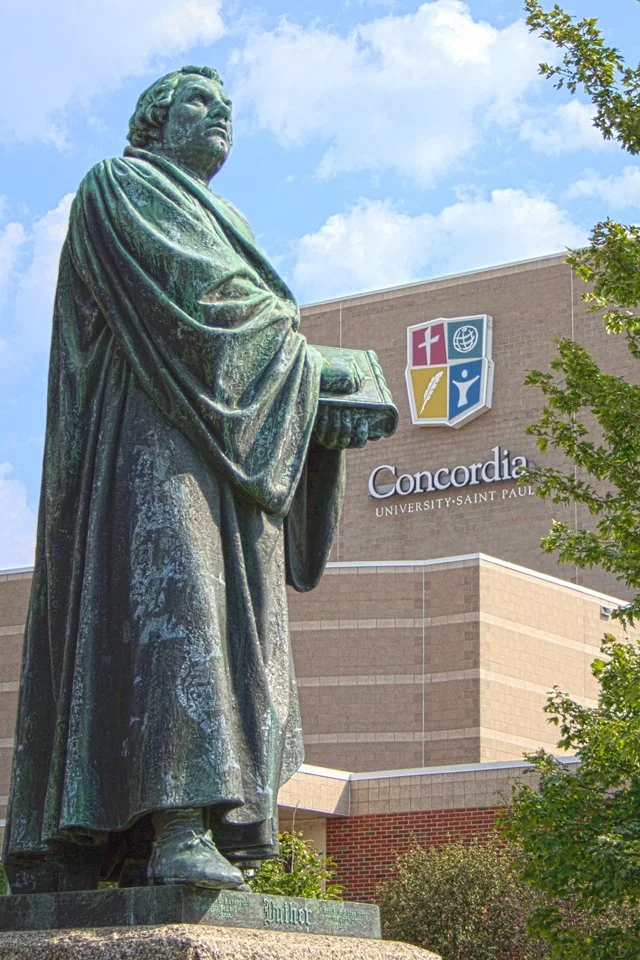Music Review: Freedom Lessons
“This is a story about abject freedom,” sings Blake Flattley for the opening lines of 1517 Music’s Freedom Lessons—a hip-hop album about Luther’s Small Catechism. Yes, a hip-hop album about Luther’s Small Catechism. The catalyst of this project is Grammy nominated artist Marcus “FLAME” Gray. Flame is a convert to Lutheranism from the Reformed tradition and each project he has worked on since becoming Lutheran demonstrates this commitment. Flame spoke at the Lutheran Church—Missouri Synod’s national convention last summer and was recently honored by the Atlantic District of the LCMS for being a “witness in the public square.” He has become a sought-after speaker due to his distinct story as a hip-hop artist who discovered the freedom of Lutheran theology.
Flame, Flattley, Nayanna Holley, Loso, and Steve Zank round out the main musical contributors to Freedom Lessons. Two of the voices featured on the album’s opening track are two voices who need no introduction to readers of LF—Robert Kolb and the late James Nestingen. Kolb and Nestingen were consultants on the project and their lines recorded on the opening song act as an explainer for the name of the album. The story of Luther’s catechism is a story of Christian freedom and Luther intended for his catechism to be a lifelong tool for Christian living. A major distinction of Christian Living in the Lutheran tradition is this notion of freedom—true freedom. Free from sin, death, and the devil the Christian is free to love God and neighbor. This discovery appears to be animating Flame in a way similar to how Luther was animated in the sixteenth century.
Freedom does many things for the human creature, and one of those things Freedom Lessons draws out is how freedom may act as a conduit for the human creature discovering true meaning and identity. As a lifelong tool for Christian living catechesis is less science and more art. The Small Catechism is not primarily a head trip that delivers content—it’s about shaping the human creature to fear, love, and trust in God for their identity. The Lutheran tradition champions the idea that redemptive faith is not the content of faith (like a creed); it is a faith that displays creaturely trust in the Creator. Faith is trust. Trust means I am in a right relationship with my other and if I am in a right relationship then I am free to be truly me—a beloved child of God in Christ.
The track listing for Freedom Lessons follows the order Luther sets out in the catechism. Following the title track which serves as an introduction to the project, two songs engage the struggle with God’s Law, “the old man,” and the delivery of God’s promises through the gospel (particularly through baptism). If you ever wondered what a hip-hop song about the Apostles’ Creed would sound like then you’re in luck because this album includes one. After that is the imprecatory psalm-like Can You Hear Me? which brings the listener along an existential engagement with Luther’s explanation of the Lord’s Prayer. Then the previously released single Means of Grace demonstrates the ordinary ways in which God’s power is given to everyday people. Table of Duties brings the album to its near completion around the coalescing theme of freedom. All contributors appear on this song—and this song only—to display the importance of a gospel-centered understanding of vocation. The Blessing puts the stamp on Freedom Lessons with a resounding refrain of “Amen, Amen, Lord let it be”—or as Luther puts it, “This is most certainly true.”
Even if a hip-hop album—or a hip-hop album on the catechism—isn’t your cup of tea this kind of project is significant. It directly engages the material of the catechism in an audacious manner and makes it accessible to people. We may want to take away that lesson from Freedom Lessons. Luther’s Small Catechism is the measure by which parishioners are made in the Evangelical Lutheran tradition. We can make this catechism accessible to people instead of assuming a basic understanding of what it means. Luther’s introduction to the Large Catechism assumes little to no knowledge of the Christian faith in church and society—and the Small Catechism’s structure prioritizes making Christian faith accessible. Luther knew the Christian faith wasn’t accessible and it needed to be in order for folks to be really free. Freedom Lessons appears to understand today’s assignment.
Freedom Lessons is produced by FLAME, Blake Flattley, Mashell, and Steve Zank. To learn more about Freedom Lessons, including how to listen, visit the 1517 website.
Track Listing




